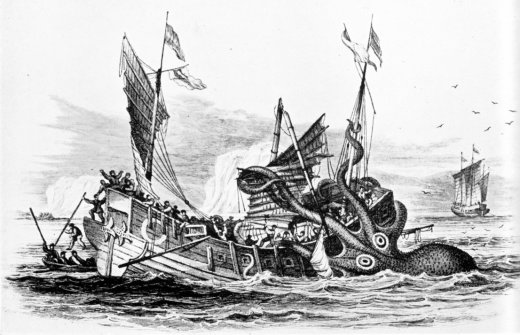Below the thunders of the upper deep;
Far, far beneath in the abysmal sea,
His ancient, dreamless, uninvaded sleep
The Kraken sleepeth: faintest sunlights flee
About his shadowy sides: above him swell
Huge sponges of millennial growth and height;
And far away into the sickly light,
From many a wondrous grot and secret cell
Unnumbered and enormous polypi
Winnow with giant arms the slumbering green.
There hath he lain for ages and will lie
Battening upon huge sea-worms in his sleep,
Until the latter fire shall heat the deep;
Then once by man and angels to be seen,
In roaring he shall rise and on the surface die.

‘The Kraken’ has long been one of my favourite Tennyson poems and because this irregular sonnet is so short, I’ve quoted it in full above. I like the tension between the potentially deadly power of the creature being described and the quiet peacefulness of the poem’s journey beneath the sea that is jarred by the turn at the end with the description of the creature’s fiery death.
Norse Myth
This poem was first published in 1830 in Poems Chiefly Lyrical. The Kraken is a Norwegian mythological sea monster and we know that Tennyson was well versed in Norse myths because he made the following note in reference to the poem: ‘See the account which Erik Pontoppidan, the Norwegian bishop, born 1698 gives of the fabulous sea-monster—the Kraken (Biographie Universelle)’ (Oxford, Major Works, p. 559).
The Kraken sleepeth . . .
Tennyson’s description of the legendary creature and its abode at the bottom of the sea is rich in detail. The speaker takes us with him as he descends into the deep to contemplate the ancient creature.
The light is faint as the Kraken sleeps his dreamless sleep. His size and age are amplified by the description of ‘Huge sponges of millennial growth and height’ living above him. He, apparently, has been sleeping on the ocean floor for many millennia. He has been eating ‘huge sea-worms in his sleep’; these will both help him maintain his colossal size and give him the energy to roar to the surface at the end of the world. Tennyson refers to the book of Revelations when he describes ‘the latter fire’ that will ‘heat the deep’ and burn the Kraken when he surfaces.
Jules Verne
Tales of the Kraken and sightings of giant squid have inspired many artists over the centuries. For example, in 1870, forty years after Tennyson published ‘The Kraken’, Jules Verne describes similar creatures in Twenty Thousand Leagues Under the Sea. In 1954 the story was also made into a film of the same name.
What are your favourite reworkings of the myth of the Kraken?